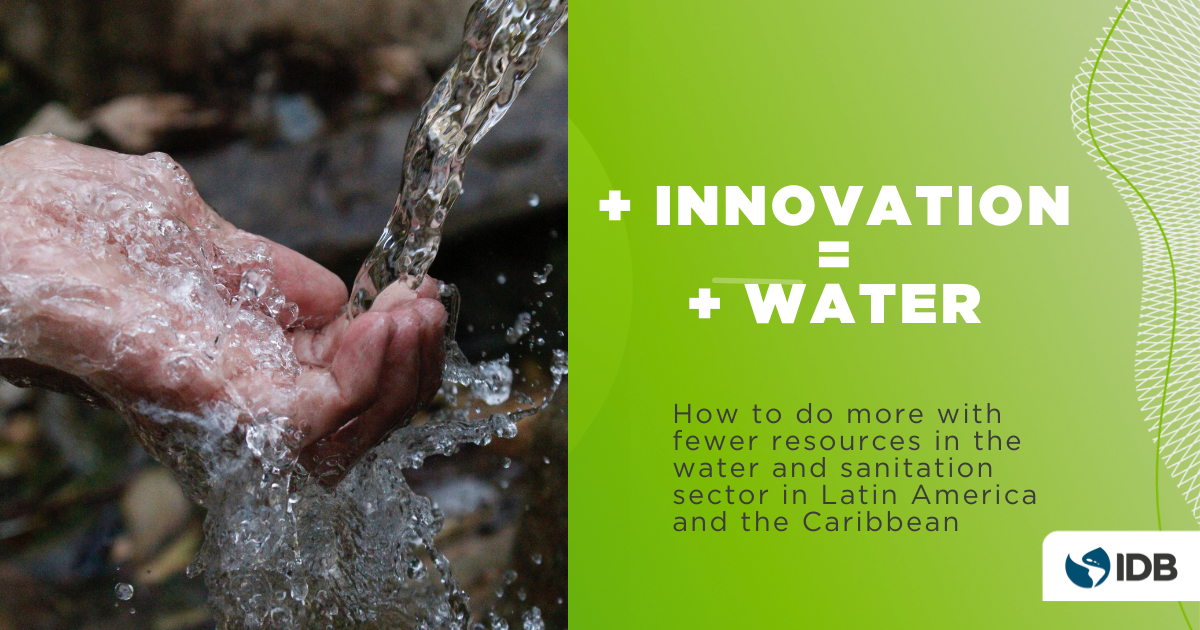A successful innovation strategy in Latin America and the Caribbean must combine technology with social innovation and new business and management models.
Nya is an 11-year-old who, in 2008 had to take a long eight-hour walk to fetch water from the pond. She could not even imagine that 2 years later, the United Nations General Assembly would recognize the human right to water and sanitation and acknowledged that clean drinking water and sanitation are essential to the realization of all human rights.
12 years have passed, a lot of water has passed under the bridge and many kilometers have been walked. And yet, in Latin America and the Caribbean, only 75 percent of the population has access to safely managed water services and just 34 percent to safely managed sanitation. To complicate the sanitation challenges, only 53 percent of municipal solid waste ends up in properly managed landfills, and the recycling rate is less than 5 percent. Universalizing access to water and sanitation by 2030 would require US$27 billion per year, a nearly fivefold increase in investment compared with 2019. The need for resources increases by a further US$14 billion per year once the targets for solid waste are considered. Is Nya doomed to keep walking?
Innovation has always opened new opportunities for growth and efficiency. It is now urgent to bring innovation to the region, and into the water, sanitation and solid waste sector, to do things faster, cheaper, and more efficiently. At the international level, digitalization initiatives in the sector have already resulted in gains in the operation and maintenance of the water and sanitation networks of up to 25 percent.
To innovate in the sector, 4 challenges must be addressed:
- Most managers within public utilities do not manage innovation as a business process and demonstrate very few innovation practices.
- Incubation and acceleration opportunities for start-ups are scarce.
- The region lacks open mechanisms to promote the interaction among sectoral stakeholders. In practice: service providers and innovators do not talk to each other.
- The culture of innovation among service providers is incipient, and the much-needed legal, regulatory and institutional policy sectoral frameworks to favor innovation are absent.
The good news is that the Latin American and Caribbean people, with their explosion of inventiveness, passion, and diversity, can bring about a unique cocktail of ingredients to innovate toward better services. An IDB study revealed that innovation comes as a result of creative combinations of social and organizational solutions with technological innovations in the region. This could be a great advantage, in a sector where innovation is generally more incremental than disruptive.
The IDB Group believes in this unique cocktail: technology must be accompanied by social innovation and new business and management models.
We are eager to support this journey towards better services for all. For this reason, we launched Source of Innovation, a set of activities and financing mechanisms that, while addressing the 4 challenges mentioned above, promote the development and integration of innovative solutions in the water, sanitation and solid waste sector. These innovations can provide universal safely managed water, sanitation, and solid waste management services. Innovation can indeed create better services.
We must build alliances between public and private actors, operators and innovative companies, and communities and research centers in the region. Do join us and be a Source of Innovation for the sector!


Hi Marcello Basani, please be introduced to Africa Prosperity Inc. http://www.resiliencie.com . We focus on sub-Saharan Africa because the need is most apparent, but our interventions are no less applicable in Latin America. Please consider our innovations in your search. The transformative interventions of WASH and development described can be localized, creating innumerable livelihoods, addressing nearly all of the SDGs. Importantly, these interventions are *affordable.* We include energy efficiency optimized cookstoves because of the numerous synergies between these and the WASH interventions.
Training starts with the simple production of insulating rocket stoves and candle water filters. Second phase training includes production of toilets, large-scale, point-of-use water treatment, and numerous additional products. Check out this video of our insulating rocket stove of training in Rwanda, in March 2022, boiling water, fueled by leaves and sticks. There is no smoke! Save a forest! Prevent respiratory illnesses! This stove uniquely burns solid fuel cleanly! Wouldn’t adoption of these interventions help in preventing the perceived need to emigrate? https://drive.google.com/file/d/1unAt9nGQHCSgtGxEDjDpzQkCxATnFDFP/view?usp=sharing
Incidentally, your biggest impact in providing safe drinking water could come from water filter media and systems of granulated ceramics, of the type shown in this picture, large-scale point-of-use filter systems. It should be possible to produce the granulated filter media almost anywhere. https://drive.google.com/file/d/1WEuo6wj5RBk9qz3kh2JN1Z3TguB102xn/view?usp=sharing
Please have a look at the article of this link for better information, *Filtering safe drinking water through granulated ceramics* These filter systems will leave no one behind for safe drinking water.: http://tamceramics.com/wp-content/uploads/2019/01/TAM-feature_01-02-2019.pdf